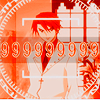Many characters in the Ocean King's sea, particularly certain members of the Cobble, have long Hylian ears. As I've already discussed with you, so do many people in the Hyrulean Great Sea.
We have discussed this, and everyone except you came to the clear conclusion that not only did the far majority of the islanders have short round ears, but that it was necessary in order for the kidnapped girls to be distinguished by their long ears. Saying that there's a pattern of the kidnapped girls having long ears makes no sense in the context of everyone having long ears. But let's not debate this again; god knows it created enough headaches the first time.
It is clear from the reality of the Christian mission that when scripture says that Christ saved Israel it refers to the entire people of God, who come from every nation, not only the physical nation of Israel. A journalist put it best: "To be Christian means to abandon one's gentile, that is, tribal, character and become part of another nation, a new Israel." This is central to Christian theology, and in fact a very prominent idea; where the Jews were God's holy people and were very secluded within their ethnicity, Christianity extended the family/kingdom/nation of God to all men. All men became part of the new Israel.
So you're saying that all people in the Zelda universe, regardless of long ears, become Hylian? And that, according to this definition, all lands in the world become Hyrule? There's a problem I have with this; namely the lack of evidence. The reason I referred to Israel is because there were some clear visible parallels between the Jewish holy land and Hyrule, which I was also able to apply to other faiths (like the Mount Olympus example). Not only can you not apply this Christian theology to Hyrule, but you cannot apply it to any other mythological context to lend it a sense of universality in myth.
A new Hyrule would also involve the chosen of the gods, but in another sense. TWW says that the gods chose people who would built a new country and they fled to the mountaintops. These "chosen ones" would be the chosen of the next Hyrule. In that sense, Hyrule would still in a sense be the land of those chosen by the gods. It would not necessarily be holy in the sense that it would not be the land where the goddesses left the Triforce at the creation of the world, but if the land were to be blessed by the Triforce (either as a result of Daphnes's wish or some future wish), that would suffice as well, would it not?
Alright, let's establish some missing context here. The gods built a tower to test the worthiness of men, until one individual could establish the right to wield the Master Sword and slay Ganon. The King of Hyrule said that the people would one day revive the holy land of Hyrule (the Japanese translation places "Hyrule" in the context of the land that the goddesses sealed away), and he also said that these people were chosen to build a new country. I would consider it obvious within this context that the gods intended the holy land of Hyrule to be revived in order for the islanders to re-establish the kingdom there. As for the term, "
build a new country", it can either refer to rebuilding Hyrule from the ground-up, or it can refer to the establishment of a new country until the old Hyrule can be awakened. It doesn't contradict the obvious intent that the Hyrulians were meant to rebuild the kingdom of Old Hyrule.
This is not central to my theory, so I don't really place too much emphasis on it, but it seems clear that, in AoL for instance, when Link reunites the Triforce he uses it to restore Hyrule to some lost glory. The AoL scroll and crystals were supposedly set aside until the next time that a "great king" would come (that Link implied to be Link). Since LoZ/AoL's world is a "world of chaos," I would say that it is in a state without the Triforce's blessing, and that AoL Link, by accepting the quest to reunite the Triforce for his generation, becomes the "light of hope" that dispels the chaos and brings order. I think that this chaos fits perfectly with the world we see in TWW, in which the world is made up of scattered peoples on scattered islands and pirates roam the seas, and that AoL Link by becoming the "light of hope" fulfills Daphnes's wish for hope for the people.
So let me get this straight; Daphnes is a good guy, and he brings a ray of hope to the world with his wish on the Triforce. Link is a good guy, and he brings a ray of hope to the world with his wish on the Triforce. You're saying that this theme of bringing hope to Hyrule thematically ties TWW and AoL, and thus connects them in the timeline? You don't think the simple act of destroying evil, an entity of chaos, brings hope to the world? That theme not only connects all the Zelda games ever made, but also the Lord of the Rings trilogy and other fantasy stories. Oh, and btw, the Japanese translation of Daphnes's speech doesn't refer to a "ray/light of hope". I hope you weren't reading too much into that...
PS: For simplicity's sake, I'm moving the debate from the "New Timeline" topic here:
I disagree. Daphnes destroyed Hyrule so that the new kingdom would be one of his descendants' making. TWW already implies that the kingdom survived via the people who the gods commanded to flee to the mountaintops and avoid destruction. "The gods knew that to seal the people away would grant Ganon's wish for the destruction of the land..."
The Japanese translation does not refer to the "destruction of the land"; never is it suggested that the holy land of Hyrule diminishes with the absence of the Hylians. What
is said to diminish is the kingdom, which makes sense because a land without people cannot be called a kingdom. And with that said, I think it's quite obvious that the kingdom of Hyrule is a holy communion between the land and people. When the land was sealed, the people were chosen to awaken it, as the King of Hyrule said they were destined to do.
Edited by Raian, 10 December 2008 - 06:32 PM.

















